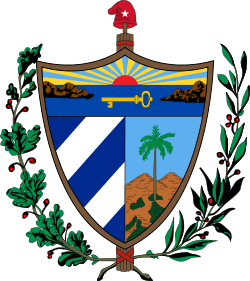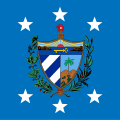President of Cuba
| President of the Council of State of Cuba
Presidente del Consejo de Estado de Cuba | |
|---|---|
|
Official Standard | |
| Residence | Palacio de la Revolución |
| Appointer | National Assembly of People's Power |
| Term length | Five years, renewable once [1] |
| Inaugural holder | Fidel Castro (1976 Constitution) |
| Formation | 1902 |
 |
| This article is part of a series on the politics and government of Cuba |
|
Executive |
|
Judiciary
|
The President of Cuba (Spanish: Presidente de Cuba), officially called from 1976 President of the Council of State (Spanish: Presidente del Consejo de Estado de Cuba), is the head of the Council of State of Cuba. The current office is established under the Constitution of 1976.
The President of the Council of State is, at the same time, the President (as Prime Minister) of the Council of Ministers of Cuba, the head of government. In cases of the absence, illness or death of the President of the Council of State, the First Vice President assumes the President’s duties.
Powers
The President of Cuba has the power to:
- Propose to the National Assembly of People’s Power, once elected by that body, the members of the Council of Ministers;
- Accept (based on personal preference) the resignation of the members of the Council of Ministers or propose either to the National Assembly of People’s Power or the Council of State the replacement of any of those members and, in both cases, to propose the corresponding substitutes;
- Receive the credentials of the heads of delegation of foreign diplomatic missions. This responsibility may be delegated to any of the vice presidents of the Council of State;
- Assume the supreme command of all armed forces and determine their general organization;
- Preside over the National Defense Council;
- Declare a state emergency in those cases provided for in this Constitution, stating his decision, as soon as the circumstances permit it, to the National Assembly of People’s Power or to the Council of State if the Assembly is unable to meet, according to legal effects;
- Sign decree-laws and other resolutions of the Council of State and the legal provisions adopted by the Council of Ministers or its Executive Committee, and arrange for their publication in the Official Gazette of the Republic;
- Assume all other duties assigned it by the Constitution or by law.
See also
References
- ↑ "Raul Castro says Cuba needs term limits for its leaders". Retrieved 2016-09-07.
This article is issued from Wikipedia - version of the 12/1/2016. The text is available under the Creative Commons Attribution/Share Alike but additional terms may apply for the media files.

